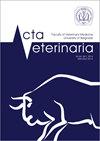野猪中的沙门氏菌:特性和流行病学
IF 0.8
4区 农林科学
Q3 VETERINARY SCIENCES
引用次数: 2
摘要
摘要对塞尔维亚伏伊伏丁那西南部12个狩猎区的野猪种群中的沙门氏菌进行了大规模研究,目的是调查沙门氏菌在野猪中的流行情况并追踪沙门氏菌的来源。狩猎区具有类似的流行病学特征,即低地地区有密集的野猪管理系统。测定了沙门氏菌在野猪中的流行率,并对从野猪和家畜(附近农场的猪和家禽)中分离的菌株的分子相似性进行了检查。对官方狩猎的425头野猪(占总种群的25.3%)进行了采样(425份粪便和425份肠系膜淋巴结样本),并通过标准ISO协议进行了检查。通过脉冲场凝胶电泳(PFGE)对分离株进行亚型分析和比较。粪便样本中沙门氏菌的检出率为3.1%,淋巴结中沙门氏杆菌检出率为0.2%。肠炎沙门氏菌是最主要的血清型。从野猪和家畜身上分离出的沙门氏菌具有高度的分子相似性。社区和家畜的接近以及动物粪便的不当清除被确定为重要的流行病学因素,这些因素对低地野猪的沙门氏菌流行病学产生了重大影响。本文章由计算机程序翻译,如有差异,请以英文原文为准。
Salmonella in Wild Boars (Sus Scrofa): Characterization and Epidemiology
Abstract The large study on Salmonella spp. in the population of wild boars from twelve hunting estates in the South-West Vojvodina, Serbia was conducted with the aim to investigate the prevalence of Salmonella spp. in wild boars and to trace Salmonella sources. The hunting estates had similar epidemiological characteristics, i.e. lowland regions with an intensive management system of wild boars. The prevalence of Salmonella in wild boars was determined and the examination of molecular similarities of strains isolated from wild boars and domestic animals (pigs and poultry from nearby farms) was performed. The total number of 425 wild boars (25.3% of total population), shot on official hunts, were sampled (425 feces and 425 mesenteric lymph nodes samples) and examined by standard ISO protocols. Subtyping of the isolates was performed and compared by Pulsed-field gel electrophoresis (PFGE). The Salmonella prevalence in the fecal samples was 3.1% and in the lymph nodes was 0.2%. Salmonella Enteritidis was the most dominant serotype. A high molecular similarity was found between Salmonella isolates from wild boars and domestic animals. The proximity of communities and domestic animals, as well as improper removal of animal waste were identified as important epidemiological factors which significantly affect the epidemiology of Salmonella in wild boars from lowlands.
求助全文
通过发布文献求助,成功后即可免费获取论文全文。
去求助
来源期刊

Acta Veterinaria-Beograd
农林科学-兽医学
CiteScore
1.30
自引率
16.70%
发文量
33
审稿时长
18-36 weeks
期刊介绍:
The Acta Veterinaria is an open access, peer-reviewed scientific journal of the Faculty of Veterinary Medicine, University of Belgrade, Serbia, dedicated to the publication of original research articles, invited review articles, and to limited extent methodology articles and case reports. The journal considers articles on all aspects of veterinary science and medicine, including the diagnosis, prevention and treatment of medical conditions of domestic, companion, farm and wild animals, as well as the biomedical processes that underlie their health.
 求助内容:
求助内容: 应助结果提醒方式:
应助结果提醒方式:


